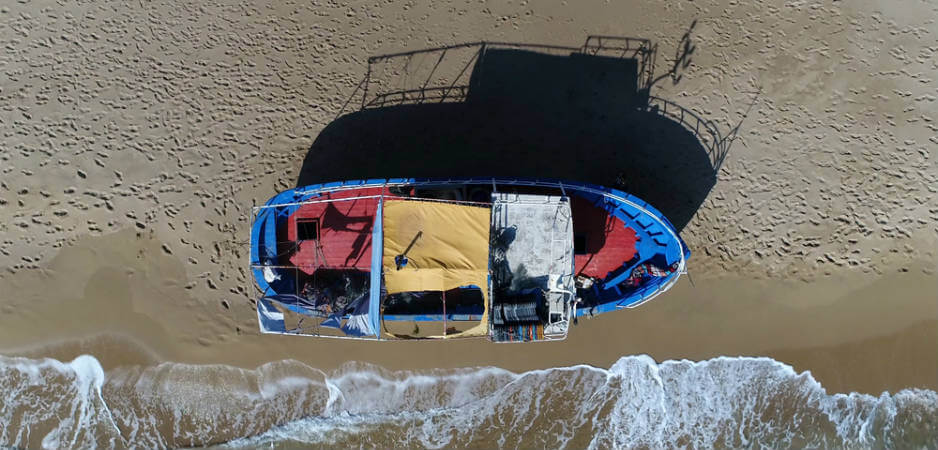Italy’s policies have failed migrants and refugees crossing from Libya, and things are about to get much worse.
Italy’s migration policies have been formidable. Returning boats headed to its shores, compelling NGOs to cease sea rescue missions and paying Libya to stop migrants leaving have all helped to curb migration. But it does so by trading off people’s dignity. With Italy’s March elections having capitalized on anti-immigrant sentiment, the situation is not likely to improve.
Most of us are aware of the perils that face migrants trying to cross the Mediterranean Sea. Between January 2012 and December 2017, UNHCR recorded 14,557 deaths from sea crossings between Libya and Italy. In addition, the International Committee of the Red Cross said that deaths occurring en route from countries of origin are “critically underreported.” Of those who survive the journey, many will have harrowing memories of sexual assault at the hands of armed gangs or of being flung into situations of slave labor or torture by soldiers.
Others are sold like chattel or detained in unthinkable conditions where they are vulnerable to further mistreatment — malnutrition, rape, forced labor, disease and even death. The whole thing is a depressing catalogue of abuse and perfect guide to dehumanization. What’s more, Libya is in the throws of armed conflict. The resulting lack of rule of law makes tackling the criminal networks responsible for smuggling and trafficking even more difficult.
Part of the reason migrants and refugees traveling through Libya receive such a menacing reception is that Libya is not a party to the 1951 Refugee Convention or its 1967 protocol. It therefore does not recognize the right to asylum, allow UNHCR to operate in the country and its detention facilities do not comply with international standards. It should therefore not be considered a safe country to return people to.
Europe’s policy has so far been focused on keeping migrants out of Europe. Boats are returned, and now the UN as well as the EU and the African Union are helping to return and repatriate migrants. This has been criticized for, firstly, the above-mentioned reason that Libya is not a safe country to return to. Secondly, some have stated that there has not been due consideration for people’s individual circumstances. Irregular migration through Libya happens for a variety of reasons: war, persecution, crippling poverty, as well as other causes. For many, returning home may not be safe and they must be resettled as quickly as possible.
Thousands have been repatriated since November 2017 and the International Organization for Migration says that those the numbers held in detention has decreased fivefold. If the numbers are accurate, this is in part a positive sign. However, estimates for the numbers of migrants in Libya are up to 1 million, meaning that much more work needs to be done.
On the whole, Europe’s approach to Libya’s crisis has been short-term and anti-immigrant. Return operations run the risk of trying to achieve targets without due consideration for what’s best to the person being returned.
Instead of centering policies on keeping migrants out of Europe, European policy should focus on how to curb irregular and unsafe migration. Addressing root causes, using diplomatic ties to help broker peace, designing smart, sustainable programming in countries of origin that provide people with access to livelihoods are all available options. Instead of short-term policies that entrap people in horrific conditions, Italy and its European neighbors should compel Libya to sign and ratify the International Refugee Convention.
International partners do already contribute to achieving some of these interventions but their results have not been as visible as those achieved by Italy’s Interior Marco Minniti under whom arrivals from Libya may have been reduced by up to 87%. This may have proven popular among Italian voters for whom immigration is a hot potato issue. But tough immigration policies should not trade off human rights obligations either domestically or internationally.
The results of Italy’s national elections have revealed no clear majority, but the fear is that control will go to the far right. If Italy’s migration policies are falling short of the mark now, they are only likely to get worse.
The views expressed in this article are the author’s own and do not necessarily reflect Fair Observer’s editorial policy.
Photo Credit: GLF Media / Shutterstock.com
Support Fair Observer
We rely on your support for our independence, diversity and quality.
For more than 10 years, Fair Observer has been free, fair and independent. No billionaire owns us, no advertisers control us. We are a reader-supported nonprofit. Unlike many other publications, we keep our content free for readers regardless of where they live or whether they can afford to pay. We have no paywalls and no ads.
In the post-truth era of fake news, echo chambers and filter bubbles, we publish a plurality of perspectives from around the world. Anyone can publish with us, but everyone goes through a rigorous editorial process. So, you get fact-checked, well-reasoned content instead of noise.
We publish 3,000+ voices from 90+ countries. We also conduct education and training programs
on subjects ranging from digital media and journalism to writing and critical thinking. This
doesn’t come cheap. Servers, editors, trainers and web developers cost
money.
Please consider supporting us on a regular basis as a recurring donor or a
sustaining member.
Will you support FO’s journalism?
We rely on your support for our independence, diversity and quality.









Commenting Guidelines
Please read our commenting guidelines before commenting.
1. Be Respectful: Please be polite to the author. Avoid hostility. The whole point of Fair Observer is openness to different perspectives from perspectives from around the world.
2. Comment Thoughtfully: Please be relevant and constructive. We do not allow personal attacks, disinformation or trolling. We will remove hate speech or incitement.
3. Contribute Usefully: Add something of value — a point of view, an argument, a personal experience or a relevant link if you are citing statistics and key facts.
Please agree to the guidelines before proceeding.